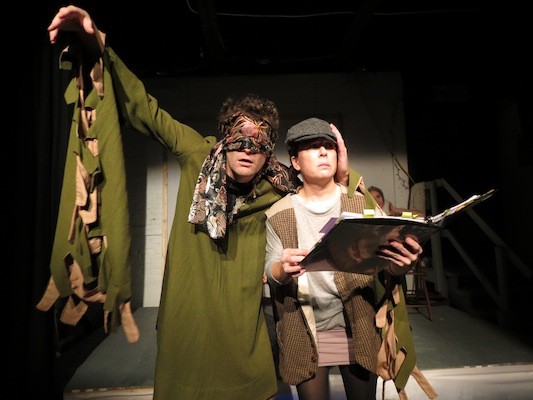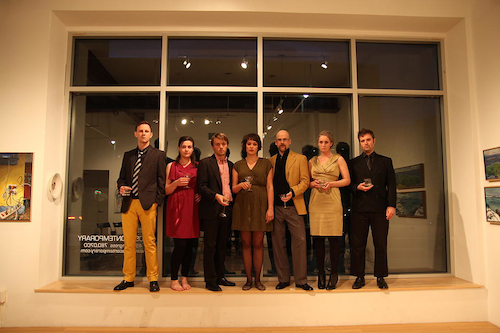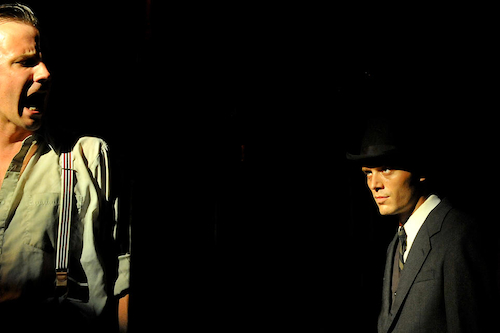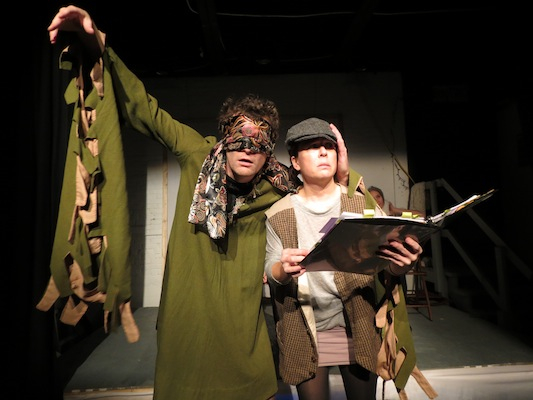
Gargantua, 2013
SPACE is thrilled to be hosting the thespians in local theater collective Lorem Ipsum as they perform two Caryl Churchill plays, Owners and Love and Information, this upcoming month (January 15-25). Directors Deirdre Fulton and Nick Schroeder answered some questions about the productions and the back story behind the collective.
Give us a little bit of Lorem Ipsum history. How and when did the group form?
Deirdre: Lorem Ipsum (though we weren’t called that yet) began five years ago this January. A few of us had been doing Viewpoints exercises at Zero Station during the winter of 2009—with no performance element tied to it—and the next winter we decided to do a play instead, which was Alfred Jarry’s Ubu Roi at the Apohadion and SPACE Gallery. A core group of us liked working together very much, and we continued to do so, forming as a collective in 2011. Since then, we’ve produced a number of full-length plays at different venues—Blood Wedding (SPACE), The Threepenny Opera (Apohadion), Ghosts (
Who’s directing Owners and Love & Information? Is the direction being kept separate, or is there any overlapping or collaboration between the two?
Deirdre: Nick is directing Love & Information and I am directing Owners. [[Fun fact: In addition to being co-founders of Lorem Ipsum, Nick and Deirdre also worked together for many years at the Portland Phoenix. Nick now serves as editor of DigPortland and Deirdre writes for CommonDreams.org.]] We are rehearsing the shows separately, more for logistical reasons than artistic ones. Three actors (Maureen Butler, Ian Carlsen, and Marjolaine Whittlesey) are performing in both, and our entire design team is working on both productions.
Nick: Deirdre and I had a number of conversations early on, so the plays are certainly in dialogue. Owners is from 1972 and Love and Info’s basically brand new, and Churchill’s style has changed radically since then. I think the plays themselves are certainly emotionally related, but they definitely require separate techniques. For example, Love and Information has no official cast list or stage directions—just dialogue—so the actors have to originate and generate more than they do in most productions.
Can you give a basic summary of each play, and explain the decision to couple these two pieces into one production at SPACE?
Nick: Sure. Owners is this big, fat, disgusting, complicated allegory about the notion of property, and how it can very quickly corrupt some basic human relationships. It’s played out by these very vivid, larger-than-life characters who supposedly love each other, but everything is buried under the surface. And there’s a lot of meat. By contrast, Love and Information puts the lens very very close, so the play is almost flipped inside out. There are about 65 scenes linked by an emotional thread rather than a narrative one. They don’t necessarily tell a complete story, but they frame certain obstacles that come between people who supposedly love or trust each other, or think they do. Deirdre and I liked how the plays related to each other and thought they bookend Churchill’s work really nicely.

Our Late Night, 2014
These are both Caryl Churchill pieces. What’s your interest in Churchill’s work… technique, themes, writing?
Deirdre: I think she just nails it in her use of language. She is simultaneously playful and cutting; she is darkly funny; her characters are surprising and layered. Putting these shows side-by-side, you can see that — the language shines in both plays, despite being showcased in totally different contexts. It’s a lot of fun for me as director and for the actors.
Nick: She’s sort of been hovering on the periphery for us awhile, and maybe also she’s reaching that stage in her life where she’s becoming easily canonized, so it felt natural. I’d worked on a short play of hers about war called Far Away ten years ago in college that was abandoned before we performed it, so I had personal stakes. I think she’s fearless. What she writes just feels very responsible to the idea of justice, both politically and emotionally. Owners kind of attacks its themes head on, very grotesque, while the language of Love and Information is so stripped down and minimal, it just kind of seeps into our own mannerisms. It’s like she stopped short of prescribing a distinct character and context, so you have to pull from your own life to get at the themes. It’s exciting.
What are(/are there) specific themes in these plays that you see as particularly relevant (socially, politically, artistically) right now?
Deirdre: I’m fascinated by how many of Churchill’s ideas about power, gender roles, and capitalism, as expressed in Owners, are as relevant in 2014 as they were in 1972.
Nick: Me too. She’s not explicit about it at all, but a lot of Love and Information’s struggles have to do with the influence of technology, and whether it actually serves to help us understand each other better.
I’m interested in hearing about how Lorem Ipsum collaborates on a project, from an idea in fledgling form to an opening night. I imagine it varies based on the work, but can you talk a bit about how creative collaboration operates successfully with several people?
Deirdre: Our productions typically arise out of one person’s interest in seeing a specific project come to life. Once we’ve all read a script and agreed that it should be a Lipsum show—a nebulous process that considers everything from aesthetics to passion to feasibility—a team comes together to shepherd it from inception to performance. Many, though not all, of our projects have an all-hands-on-deck feeling, with Lorem Ipsum members wearing multiple hats. There are seven of us and we all lead extremely busy lives; thank god for email and shared calendars! The most important element in our collaborative process is communication, about everything from nitty-gritty details to big-picture issues.
Nick: We all wear a lot of hats, and we argue and hug lot.
What’s the process of developing a cast like? Do you do your own set design and prop-building as well, or do you seek help from artists outside the collective?
Deirdre: Our process in this regard does vary from show to show. Sometimes we hold auditions; often we cast from within the company. Lorem Ipsum co-founder Corey Anderson is our technical director and oversees lighting design. We almost always collaborate with other artists from the community for everything else. On this show we tapped the talented Stacey Koloski for sets; Diane Toepfer of Ferdinand for costumes; and Max Waszak for props and dialect coaching.
Nick: It’s hard to say how we know something should be an Ipsum show; we just do. We like working with complicated, expressive, playful people, and doing this work for five years has enabled us to meet a ton of them.

The Threepenny Opera, 2011
What’s next for Lorem Ipsum?
Deirdre: We’ve received a grant from the Maine Arts Commission to tour our production of Gargantua, written by company member Ian Carlsen, to venues around Maine in 2015. We’re looking forward to getting that off the ground this spring. Visit our website (loremipsumtheater.com) to keep up with future projects.

